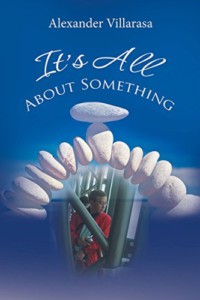 Title: It’s All About Something
Title: It’s All About Something
Author: Alexander Villarasa, M.D.
Publisher: XlibrisUS
ISBN: 9781546281894
Pages: 182
Genre: Non-Fiction
Reviewed by: Barbara Bamberger Scott
Pacific Book Review
A successful physician examines his life with poetry and philosophical speculation in Dr. Alexander Villarasa’s book titled It’s All About Something. Dr. Villarasa came to the US with his wife and first child after he had completed medical school in the Philippines. Settling, permanently as it turned out, in salubrious southern California, he followed the path which his studies and determination led him to, and now in his late sixties, shares the knowledge he has garnered. After a brief, strictly biographical segment about his early years, Dr. Villarasa turns quickly to chapters comparable to short essays, most of which begin with self-composed poems.
His interests range widely, with two major themes predominating: religion and politics. He holds to a strong belief in God and in the soul and divine creationism, informed by his understanding of science. He often quotes Albert Einstein and Stephen Hawking, two men who included in their study of the universe an oblique expression of God’s hand in the plan. The author’s political stance is solidly conservative. He offers a definition of “Trumpism” as “Triumphalism.” He spends more than two chapters enumerating the mistakes of Barack Obama, who he feels certain, was elected only because of his ability to “speechify.” He criticizes most doctors for being greedy, and some psychologists (Oprah, Dr. Phil) for being charlatans. He suggests the Age of Reason has given way to the “Age of Treason,” in which moral values have been lost. He praises his fellow Filipino immigrants who even in the lax atmosphere of US culture manage to raise their children with respect for moral values (though he also considers that the US is still the best place on earth to raise a family).
The personal memories in this collection stand out for their well-expressed sentiment. In a section about streets, the author decides to buy a house that has a view somehow reminiscent of his father’s farm. A two week visit to the Philippines after an absence of 17 years is another highlight; contrasting his impressions and those of his wife with their childhood recollections, to those of his children who are seeing, hearing and smelling a foreign country jarringly different from where they are being raised.
In later segments, Dr. Villarasa lists activities which he has gradually incorporated into his new life of retirement, including golf and travel. Writing is of course one of these new pursuits; his book an admirable testament to the intelligence and linguistic sensitivity of someone for whom English is a second language. He also speaks of his physical ailments (“The Doctor as Patient”) and offers some medical humor. Dr. Villarasa’s over-arching hope is that the force of creativity may help humans overcome some of their more disrupting, egoistic drives and lead us to what he engagingly terms “global exhilaration.”


Follow Us